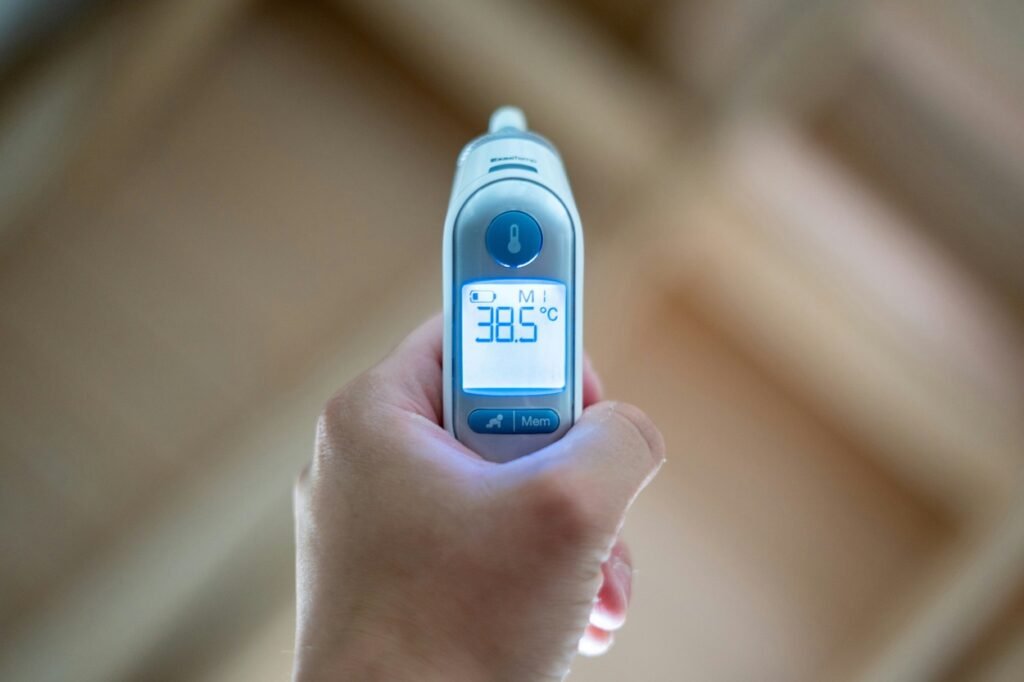Fever in babies.
Oh, the joys of parenting! Just when you finally feel like you’ve got the hang of sleep schedules, swaddling techniques, and deciphering baby babble, bam!—a fever hits, and suddenly, you’re Googling “normal baby temperature” at 3 a.m. while rocking a sweaty bundle of sadness.
Take a breath. You’re not alone.
Fevers are common in little ones. In fact, they’re often the first sign that your baby’s immune system is doing exactly what it’s meant to do—fighting off unwanted guests like viruses and bacteria. But that doesn’t make it any less stressful when those tiny bodies heat up like a little toaster oven.
Let’s walk through what you need to know (and what you can do!) when your baby’s temperature starts to rise.
Understanding Fever in Babies
First things first: What is a fever, exactly?
A fever is defined as a rectal temperature above 100.4°F (38°C). It’s the body’s natural defense mechanism—raising its internal temperature to create an unfriendly environment for germs. Think of it as nature’s very own eviction notice for viruses.
So why do babies get fevers?
- Viral Infections – From the sniffles to the flu, viruses are the number one cause of baby fevers.
- Bacterial Infections – Ear infections, strep, UTIs… sometimes bacteria are to blame.
- Teething – While controversial, some babies do run a low-grade fever when those teeth start making their grand entrance.
- Immunizations – Post-vaccine fevers are normal. Your baby’s immune system is basically shouting, “I’m working here!”
How high is too high?
That depends on your baby’s age and behavior. For newborns under 3 months, any fever is serious and needs medical attention. Older babies can often handle mild fevers as long as they’re eating, sleeping, and playing somewhat normally.
But more on when to call the doctor later—let’s first tackle what you can do.

What Can You Do?
So your baby is warm, fussy, and looking at you like you hold the keys to their comfort (because, honestly, you do). Here’s how you can help:
Monitor the Temperature
Let’s talk thermometers. There are more types than flavors at a frozen yogurt bar, and choosing the right one can feel overwhelming.
Best thermometer options by age:
- Under 3 months: Rectal thermometers are the gold standard. Not glamorous, but accurate.
- 3–6 months: Rectal still wins, but you can start using temporal artery (forehead) thermometers.
- Over 6 months: Ear, oral (for older kids), and forehead thermometers are more acceptable now.
Pro Tip: Use a dab of petroleum jelly for rectal checks. Trust me, both of you will appreciate the extra slide.
Write down readings and take them every few hours if the fever persists. You’re not just a parent anymore—you’re part nurse, part superhero.
Keep Your Baby Comfortable
Think: cool, calm, and hydrated.
Your baby doesn’t need layers of clothing or a fleece blanket fort when they’re burning up. Dress them in light, breathable fabrics, and keep the room temperature somewhere around 70°F (21°C).
Hydration is key.
- If you’re breastfeeding, offer the breast more frequently.
- Formula-fed? Smaller, more frequent bottles can help.
- For older babies who are eating solids, you can try water, clear soups, or ice chips (if age-appropriate).
A lukewarm sponge bath can also help, but no ice water, and please skip the old-school alcohol rubs (those can actually be dangerous).
Use Fever-Reducing Medications (If Needed)
Medications aren’t mandatory for every fever. If your baby is still playing peekaboo with you and eating well, you may not need anything.
But if they’re fussy, uncomfortable, or in pain, fever reducers can help:
- Acetaminophen (Tylenol): Safe for babies over 2 months.
- Ibuprofen (Advil/Motrin): Safe for babies over 6 months.
Always double-check the dosage based on your baby’s weight, not just age. And if you’re not sure, call your pediatrician. They’d rather answer your question than deal with a medication mishap.

Provide Comfort and Soothing
Ah, the magic of mommy or daddy cuddles. When babies are sick, you become their entire universe. Skin-to-skin contact, cuddling, humming, or simply lying beside them can work wonders.
You don’t need to pull off a Pinterest-worthy playroom or download classical music playlists. Sometimes, all they want is your arms, your heartbeat, and your scent.
Here are some other soothing tips:
- Rocking in a chair or baby carrier.
- White noise or soft lullabies.
- A favorite blankie or soft toy (sanitized, of course).
- Massage with baby-safe oil—especially if they’re dealing with teething-related fever and tension.
When to Seek Medical Attention
Okay, let’s get serious for a second. Not every fever needs a frantic ER visit, but some situations definitely do.
Call your pediatrician if:
- Your baby is under 3 months and has a fever over 100.4°F (38°C).
- The fever lasts more than 24 hours in babies under 2 years.
- The temperature goes above 104°F (40°C).
- Your baby is lethargic, refuses to feed, cries inconsolably, or is unusually sleepy.
- You notice labored breathing, a purple rash, persistent vomiting, or seizures.

Real Talk: Common Fever Myths—Busted!
Let’s do a quick myth-busting session.
- ❌ “Teething causes high fevers.” Not usually. Maybe a low-grade temp, but if it’s over 100.4°F, don’t blame the molars—investigate further.
- ❌ “Fevers are dangerous by themselves.” Fever is a symptom, not the villain. What matters is why it’s happening and how your baby is acting.
- ❌ “Letting the fever ‘run its course’ is dangerous.” Not always. If the baby is comfortable and alert, there’s no rush to medicate.
- ❌ “You must alternate Tylenol and Motrin.” Only do this under pediatric guidance—not because Facebook mom groups told you to.
Caring for Yourself, Too
Yes, your baby is sick—but guess what? You’re human, too. And sick babies are exhausting. Sleepless nights, constant worry, and thermometer checks every hour on the hour? That’s a full-time job.
So:
- Accept help.
- Stay hydrated.
- Take catnaps if possible.
- Remember: a calm parent is a comforting parent.
You can check the following video to know more-
Conclusion
A fever in your baby might feel like a five-alarm fire, but with the right information (and a little perspective), it becomes manageable. Your job is to observe, comfort, hydrate, and trust your instincts. Most fevers pass in a day or two—and with your love and attention, your baby will bounce back in no time.
And when in doubt? Call your pediatrician. That’s what they’re there for.
Parenting isn’t about perfection—it’s about showing up. Fever or not, you’re doing an amazing job.
Stay calm. Stay cool. And remember: This too shall pass.
